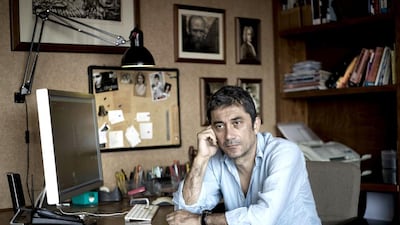Nuri Bilge Ceylan rewards his viewers for perseverance. Winter Sleep is the Turkish director’s seventh feature film and his fifth to feature in competition in Cannes.
Having previously won Best Director and the Grand Prix prize twice, the 55-year-old was the pre-Cannes favourite to win the coveted Palme d’Or. That’s despite the fact that, at three hours and 16 minutes, his is the longest film in competition.
The action starts with a boy, Ilyas (Emirhan Doruktutan) throwing a stone at the car of Aydin (Haluk Bilginer), a former actor who owns several houses and a hotel in Anatolia. Aydin is also the landlord of Ilyas’s father Ismail (Nejat Isler), who has been going through hard times and is struggling to pay the rent. Living with Aydin is his recently divorced sister Necla (Demet Akbag) and his much younger wife Nihal (Melisa Sözen).
Ceylan unveils his tale with the longest, most dialogue-heavy scenes seen since Quentin Tarantino brought Inglourious Basterds to the Croisette. Like Tarantino, Ceylan has a remarkable knack for fusing his dialogue with comedy, sharp wit and great drama. A purveyor of slow cinema, he also takes his time introducing characters, so when the drama kicks in, the twists and turns produce moral conundrums similar to those seen in the works of Ingmar Bergman and the Iranian master Asghar Farhardi.
Ceylan says: “There is no advantage of making a film long, nobody likes it – the audience or the distributors – but I like the challenge. Also, I know that the film lives its life in the DVD world after it has been in the cinema for three months. There it lives for years and you can watch the film in segments, like a book – you don’t finish a book in one reading. I wanted the freedom of a novel writer.”
He has achieved that goal. The deliberate pacing also means the story often has the feel of a great novel. In the analysis of relationships, class struggles and gender, he is inspired by the great Russian author Anton Chekhov, who is credited by the director. Although Ceylan adds: “I borrowed heavily from his short stories but I don’t want to say which ones.” He’d rather people found out for themselves.
Aydin is a moralising soul who writes a column on life in his local paper and wants to write a book on the history of Turkish theatre. His hotel is called Othello, which the director said he chose because the Shakespeare play contains the word “hotel” in its title. Yet Aydin is a man of many follies and sees an importance in his work that is beautifully countered by his wife and sister.
“I think all the arguments on journalism have some truth,” says Ceylan. “The truth is that there is not just one dimension. There are good sides to writing for a local paper and then there are advantages to writing for a big national paper. But the thing is that this is a guy who exaggerates the advantage of writing for a local paper and this makes his sister nervous.”
The film contains some of the best dialogue between the sexes that you are likely to hear in any film this year. “I used my personal experience and I would remember discussions with my wife. It normally takes hours and some things you discuss more than once.”
The screening in Cannes, however, was overshadowed by the mining disaster in Turkey last week. When interviewed on a Cannes beach on Saturday, Ceylan was wearing a sticker that said “SOMA” and “not an accident”.
“I was deeply saddened by what happened,” says Ceylan. “We came here and it happened on the first day. I don’t want to comment too much on it because it would take all night.”
• The Cannes International Film Festival runs until Sunday
artslife@thenational.ae


